We've Come to Banish the Darkness: Meet the Volunteers Bringing Joy to Cancer Patients - Not Just During Chanukah
"There is still a great lack of 'joy injections'. A doctor enters a patient's room and does not usually care for the soul, as their job is to care for the body. Our role is to administer 500 mg of joy to the soul, illuminate the light, and give the patient strength to overcome the difficult period they are experiencing," says Shlomo Mizrahi, chairman of 'Nefesh, Ruach, Neshama'.
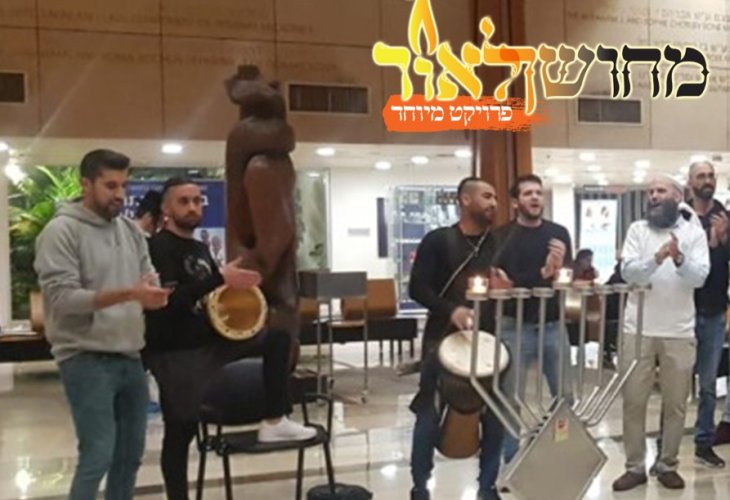
It's not every day that you meet people who put their lives on hold, setting aside their problems just to bring happiness to others. Such are the volunteers of the 'Nefesh, Ruach, Neshama' organization, committed to continuously giving to cancer patients and those in need.
Shlomo Mizrahi (43), chairman of the organization who started his involvement ten years ago, shares the transformation it brings to the lives of patients as well as the volunteers themselves—a transformation even the medical teams at Beilinson didn't believe would happen.
"When we first started our activities at the hospital, no one truly believed it would change anything in the patients' lives," Mizrahi recalls.
How is this different from those who come occasionally? they asked. Medical teams were used to seeing representatives from different organizations before the holidays, but throughout the year, it was rare to find them walking through the gray corridors, instilling hope in the burdened, despairing, and exhausted hearts of the patients.
This is what sets this organization apart: the volunteers of 'Nefesh, Ruach, Neshama' understand the privilege they have to be there for those in need and have turned it into a real way of life.
Thanks to them, cancer patients at the Davidoff Center in Beilinson enjoy visits not only before Chanukah, to distribute donuts and sing 'Maoz Tzur', but also not just on Purim—to wear costumes and distribute gift baskets, or on Passover—to burn the remaining chametz and wish a happy festival of freedom. The volunteers redefine freedom and ensure it is lived and breathed throughout the year.
"Joy isn't found here; here there's only sadness"
What gives them the strength to adhere to the mission every week, bringing over 300 volunteers, including musicians, photographers, and clowns, to consistently engage in activities at hospitals? According to Mizrahi, "You need to experience it at least once in your life to understand the magnitude of the mission. How did a mother of a child with cancer put it? 'It doesn’t matter how many organizations there are – it’s still not enough, it’s never enough.' And it's true. There are many organizations supporting cancer patients, but there's still a great lack of 'joy injections'. A doctor entering a patient's room is not primarily concerned with their spirit. Their focus is the body. Our job is to administer 500 mg of joy to the soul, lighten the darkness, and give the patient the strength to overcome their difficult period."
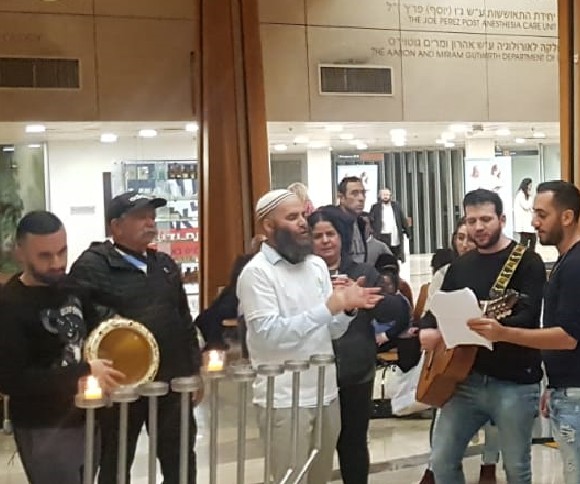
Now close your eyes and imagine the following scene: a white corridor smelling of disinfectant, bone-chilling quiet, a dark and dim room, a depressing atmosphere filled with fatigue and despair, tears, words choked into a Psalms book, and... sleep. Again, sleep. Sleeping all day, just to escape. So as not to live through these painful moments 24 hours a day. Sleep, because it’s the only thing that somehow still provides comfort.
And then, suddenly, sounds of joy cut through the silence. "Nonsense," thinks the patient, already accustomed to hallucinations. "This surely doesn't come from here. Here, joy isn’t present, only sadness."
But then the sounds of joy become more significant, right outside their door. Then the light comes on, and dozens of volunteers with smiles and bright eyes come in. They dance, sing, clap, and invite the patient to choose their favorite song. The musicians play it, and the volunteers sing it. "We came just for you, especially for you, to make you happy and to show you that where there is sadness, there is always also joy," they convey without words, filling the patient with strength only they can give.
"No matter what challenge you face, the sense of mission is always greater"
Imagine how easy it is to choose to be part of this.
"When I realized there was a void that would greatly benefit from more light, I looked for ways to be that light," says Mizrahi.
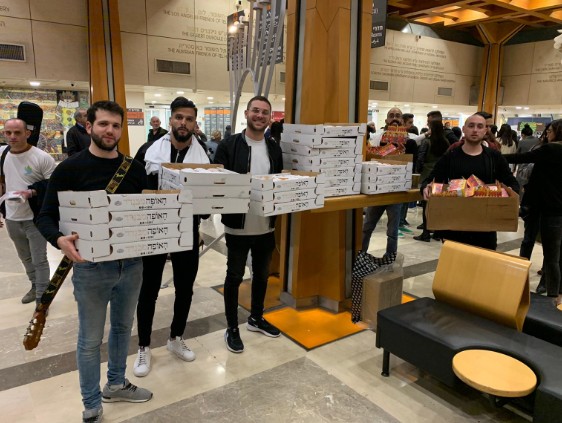
Within the light, there are also challenging dark moments. You enter sensitive places, wandering between hospital rooms, often seeing and hearing difficult things. Did you even know what you were getting into?
"Initially, I didn’t really know what I was getting into. I knew there was a deficiency that needed filling, but I didn’t know how others would react to me, or how what I provided would affect the receiving side. You enter a completely dark room, with the TV showing mundane programs with zero encouragement, and the first thing you detect is that there's no joy in that room. A dead room, nothing. When you walk into such a room with joy, musical instruments, songs, kind words, and smiles—the patient feels 'I am a king'. They came for me. When you know you're making a patient feel this way, you're on top of the world. You can handle anything."
Yet, there are many instances when you're not happy with the situation. How do you force yourself to be happy for those patients, even when you're not cheerful?
"That's an interesting question, because I can tell you there isn't a single activity we conducted that didn’t have at least 20 valid reasons beforehand to cancel it. There are so many obstacles around the desire to give that you're often left pondering, 'Maybe we should skip today?' But then you imagine these patients, realizing that your baggage of problems, no matter how significant, doesn’t compare to theirs. And when you comprehend what you can do for them with your smile and joy, everything pales in comparison. No matter what challenge you encounter, the sense of mission is always greater. When you understand that the contribution fuels both sides—you don't give up on that."
"A person after chemotherapy tells you leave me be, just let me sleep"
According to Shlomo, almost every visit results in miraculous occurrences. "Some people have no visitors, going through it all alone. A patient is always before or after painful treatments, chemotherapy, radiation. It’s not an easy situation. So, as the doctor comes to offer bodily treatment, we come to offer care to the soul. We inoculate the soul with the antibiotic of joy, and more than once we've seen actual miracles happen before our eyes. People who felt hopeless and resigned, suddenly get out of bed, sit with us, talk, laugh, and dance. Their families themselves say it’s something they haven’t seen them do in a long time. It moves us every time anew to see their happiness, which is also our joy. Beyond all the physical treatments, there's no doubt that a healthy body means a healthy soul, and joy is one of the most potent paths to healing."
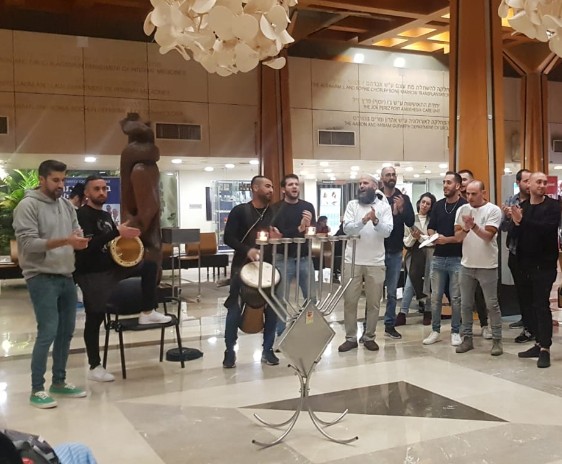
How do the patients respond?
"A person after chemotherapy tells you, 'Leave me alone now, just let me sleep.' But when you suddenly come with 500 mg of true joyous soul antibiotics—you elevate them to an entirely different place. Anyone who was initially skeptical now understands that 'clapping' is an essential activity, not just for holidays. Our volunteers consistently receive compliments after each such visit. Patients approach us smiling, blessing and thanking us. From the responses of patients and their families, you realize there's something significant here that you must continue to be part of and share with everyone you know. As the nurses at Beilinson and Tel Hashomer tell us: 'We were waiting for you'... and that says it all."
But the deeper feelings cannot be expressed in words. "Sometimes we can really see tears of excitement and gratitude on their faces stretching skyward," says Matan Perjian (24) from Petach Tikva, a darbouka player who has been volunteering for a year and bringing happiness to hundreds with his musical skills. According to him, with some patients, there’s even such a personal bond formed that "patients sometimes send messages to Shlomo’s phone, asking if we’re coming today. Some patients have no family, and when we come and dedicate a song they love, sit, talk, and laugh with them—they feel we came for them, and then they already feel better."
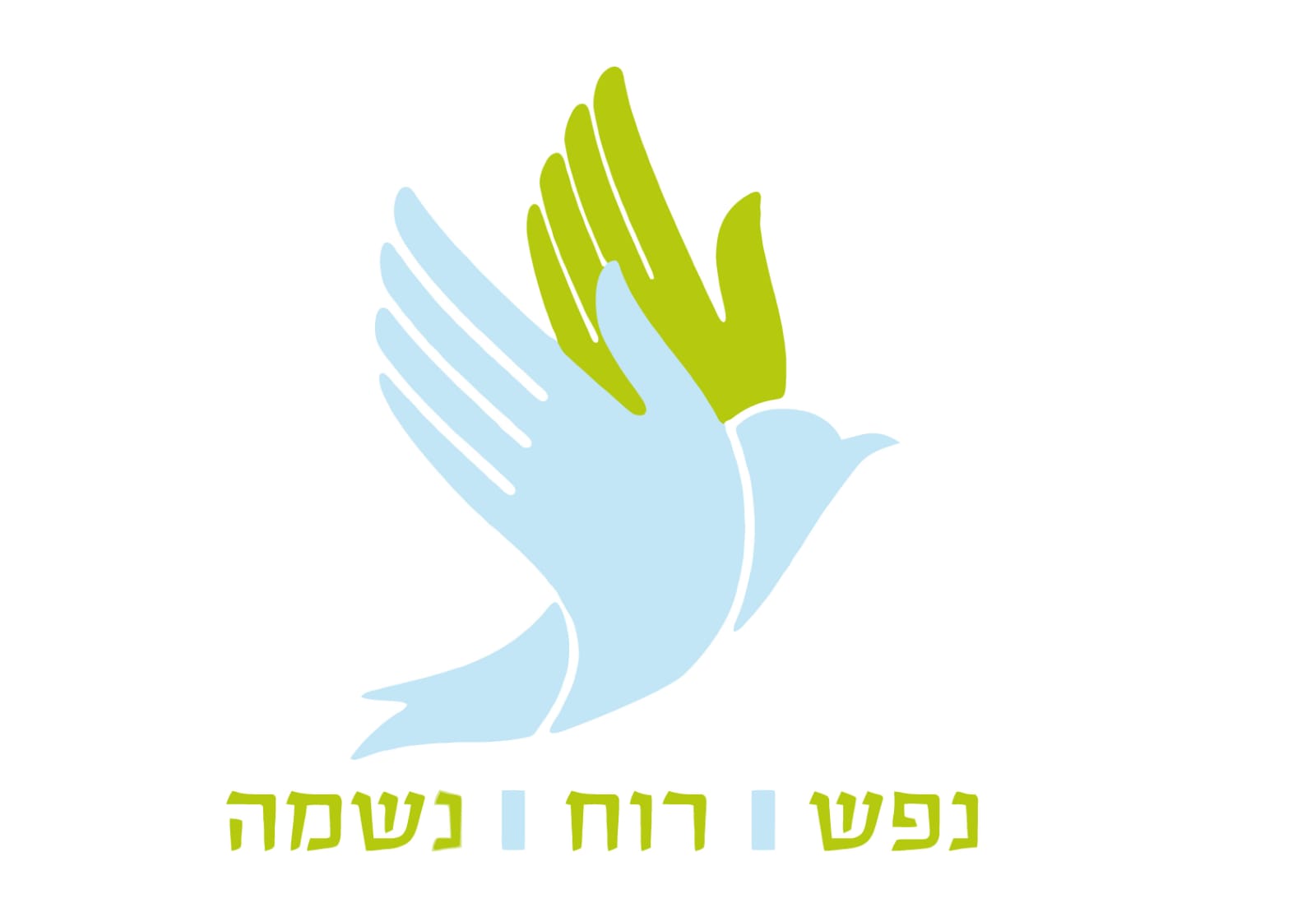 The logo of the organization as seen on the volunteers' shirts
The logo of the organization as seen on the volunteers' shirts"We focus not only on the patient but also on their family"
Shiran Ari-am (31), a manager of an insurance agents' unit in one role and a renowned volunteer with 'Nefesh, Ruach, Neshama' in another, realized over time that missing this opportunity isn’t an option. It began with holiday volunteering and quickly evolved into regular volunteering, soon yielding two large, significant fundraising events rallying dozens of top artists. "It was amazing to see the engagement and care at the Bar Mitzvah we organized for children with cancer," she says. "People were constantly moved, and we received lots of positive feedback about this activity, which you only understand how contagious it is when you do it yourself. It’s beautiful to see there are people here who genuinely love what they do, believe in it, and that’s what gives them the power to continue. We all have a choice. You can always choose not to act, as not acting is the easiest. But alternatively, if you go out and do, it will differentiate you from someone who chooses to live, versus someone who just 'exists'."
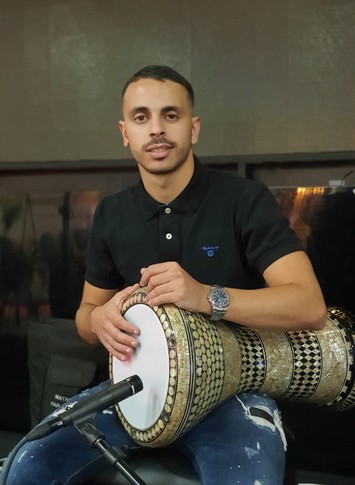 Darbouka player in action
Darbouka player in actionAccording to her, what differentiates 'Nefesh, Ruach, Neshama' from other organizations is the personal connection with cancer patients and their families—a bond that often extends beyond the hospital walls. "We focus not only on the patient but also on how their family copes with the tough situation that has arisen. Wherever we are needed, we're there. For instance, this week we're going to celebrate a private Chanukah party at the house of a cancer patient with a child who suffers from autism. Our volunteers go there to help with the child so that the family can visit their father in the hospital."
Finally, I asked Shiran whether anything has changed in her since she started volunteering with the organization, and she replied without much hesitation: "Definitely. Before volunteering, I was sure illnesses were a decree from heaven with nothing to be done. That if you’re sick, there’s no way out. But today, it has changed, and I truly think joy has a huge ability to impact. There are patients lying still, ventilated, eyes shut for a week, and suddenly when we arrive, they wake up and start moving. The more positive and happier you are, the more it will help in recovery, and we really see it in the field," she concludes.
Contact Shlomo Mizrahi by email at shlomime@gmail.com
Shlomo Mizrahi’s story is part of the 'From Darkness to Light' series for Chanukah. Know others who have stepped from darkness to light? Feel free to write to us at support@htv.co.il
Chaya Shadmi: "I was in shock, nothing prepared me for such a scenario"
"When the baby was born and didn’t breathe, I cried 'Master of the Universe, help me'"
From the depths I cried out to Hashem: "Save my eyes, and I will guard them"
A Chilling Interview: "After years of theft, here’s how I was caught"

